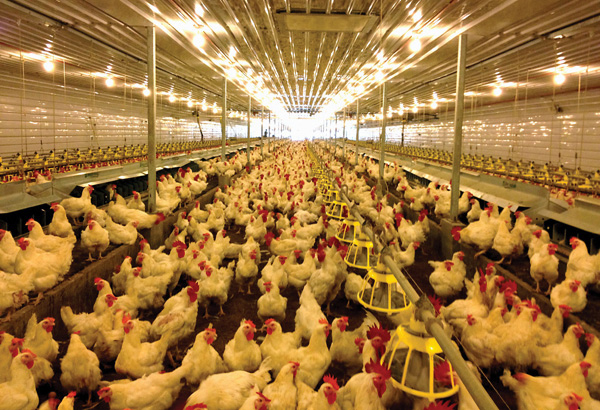Gov’t to pay P80 per slaughtered chicken

Authorities began culling some 200,000 chickens yesterday in poultry farms within the one-kilometer quarantine zone believed to be infected with the avian flu virus in San Luis town in this province. File
SAN FERNANDO, Pampanga , Philippines — Authorities began culling some 200,000 chickens yesterday in poultry farms within the one-kilometer quarantine zone believed to be infected with the avian flu virus in San Luis town in this province.
The Bureau of Animal Industry (BAI) assured poultry farm owners of compensation at P80 per head of chicken.
As the chickens and other fowl, including pigeons and roosters, were prepared early morning yesterday for slaughter in gas chambers brought to the area, Agriculture Secretary Emmanuel Piñol, through his Facebook account, said he had ordered a ban on the shipment of fowl from Luzon to other parts of the country as part of the government’s precautionary measure to prevent the spread of the virus.
Department of Health (DOH) - Central Luzon Epidemiology Unit head Dr. Jessie Fantone noted that the strain that hit and killed 37,000 fowl in six farms in San Luis was highly pathogenic type A, subtype H5, which cannot be contracted by humans.
He added that so far, no animal-to-human transmission of the virus in affected areas in Pampanga has been reported, as he gave assurance that animal-to-human transmission is low.
BAI is in the process of sending samples to the Australian Animal Health Laboratory, a World Organization for Animal Health (OIE) Reference Laboratory for avian influenza, for further testing.
Culling to be finished today
The Department of Agriculture (DA) targets to finish the culling process today.
“At most, we want to finish the depopulation not later (than) today. We will try to exhaust all our efforts and resources to finish these until today. We have to understand that we are not only talking about captive birds, we have to cull stray birds, as well,” Agriculture Undersecretary Ariel Cayanan said in a phone interview.
Last Friday, the DA confirmed the outbreak of the avian flu virus in San Luis, Pampanga – the first such case in the country – that killed close to 40,000 poultry heads and placed the province under a state of calamity.
Initial field reports as to how many heads have been culled are still under validation.
Cayanan said Pampanga Gov. Lilia Pineda is shouldering the daily labor cost for the culling process.
“She said we can hire as many as we need to fast-track the depopulation. She will also shoulder all identified logistics all throughout the depopulation period,” he added.
The department maintained that culling the rest of the poultry population in the area is necessary to control the spread of disease in the shortest possible time as the remaining 200,000 may also be infected with bird flu.
Spare migratory birds
Meanwhile, the Department of Environment and Natural Resources (DENR) yesterday warned citizens not to kill or poach migratory birds that usually fly in from China, the possible source of the avian flu virus, to avoid worsening the situation.
“The culling, poisoning or chasing of migratory birds is strongly discouraged as they have been proven ineffective and counterproductive. Close contact with the birds will risk transmission,” DENR’s Biodiversity Management Bureau director Mundita Lim said in an advisory.
“We may need to determine the actual strain and do some epidemiological assessments so we can make the proper disease management recommendations, along with the DA and the DOH, in accordance with the creation of an interagency committee on zoonosis,” she added.
Zoonosis is a disease that can be transmitted to humans from animals.
The bird migration season in the Philippines usually starts around September, with the birds returning to their breeding grounds the following March, according to Lim.
Piñol said migratory birds or smuggled ducks from China may have brought in the virus.
Sick or dead wild birds should immediately be reported to the DA to allow checks for the virus, Lim said, urging breeders in areas frequented by migratory birds to guard their flocks against contact with them.
Early tests of the virus in the outbreak ruled out the highly pathogenic H5N1 strain, but Philippine officials have sought further testing by an Australian animal health laboratory that is part of a global network combating the disease.
The Philippines is monitoring the quality and prices of poultry products in its markets, but believes farm authorities have managed to isolate and contain the virus, Malacañang said in a statement.
Environment Secretary Roy Cimatu said his department would step up surveillance against efforts to smuggle wild birds by sea and air.
- Latest
- Trending


























